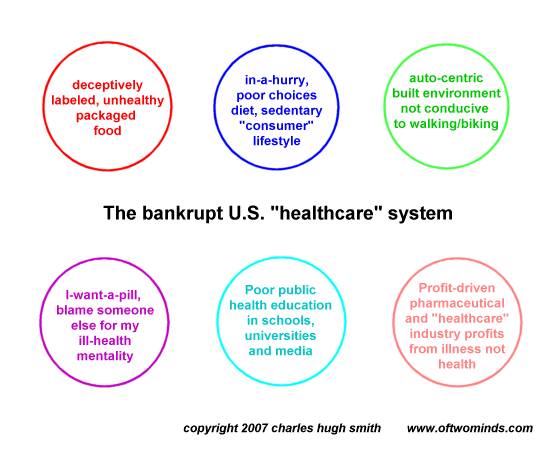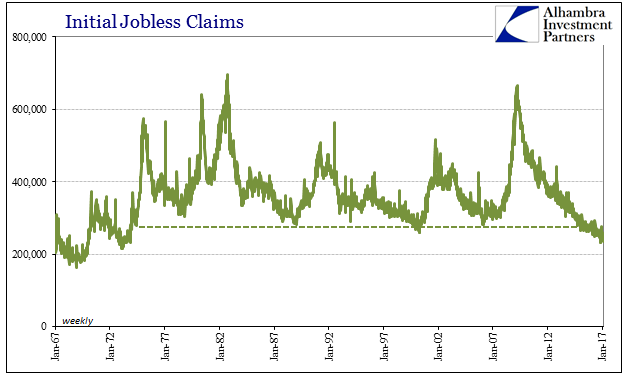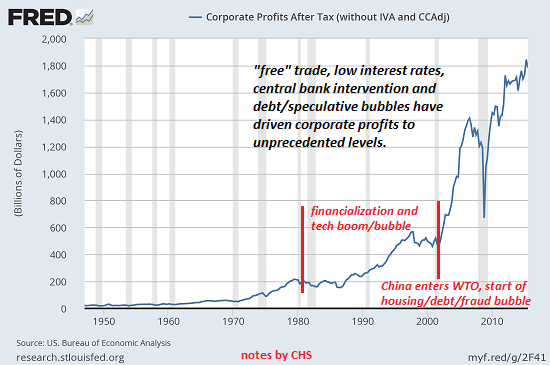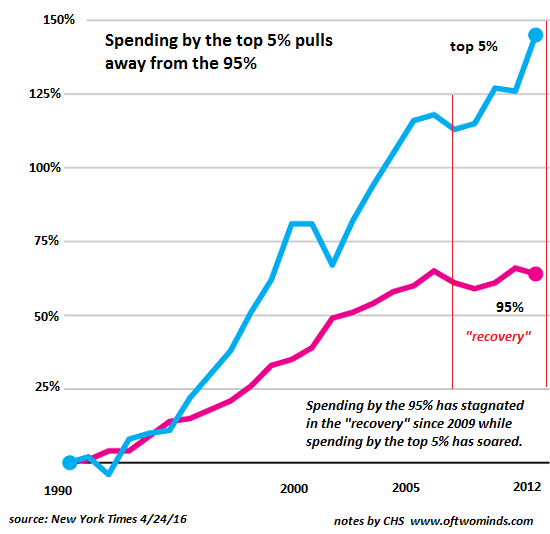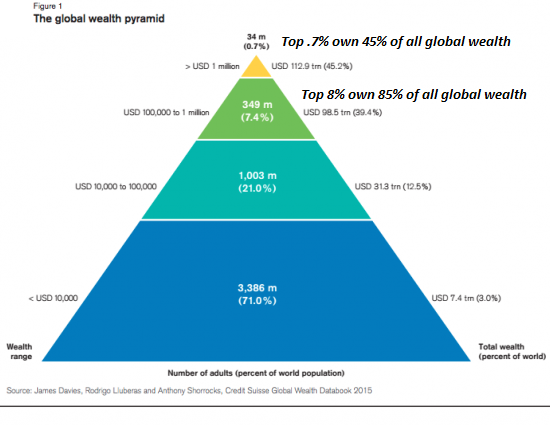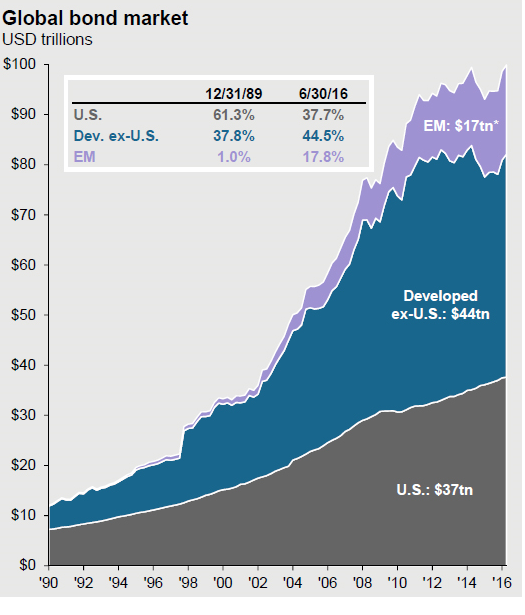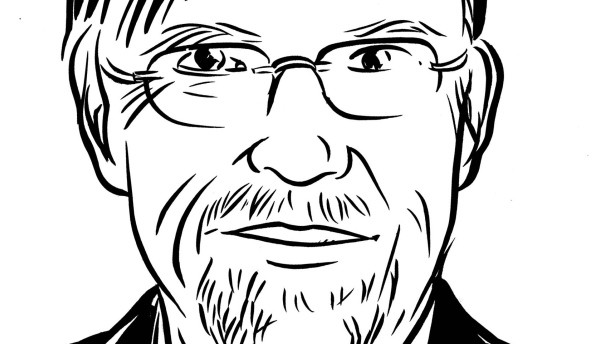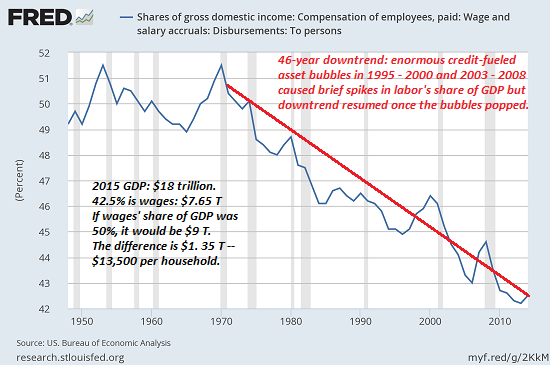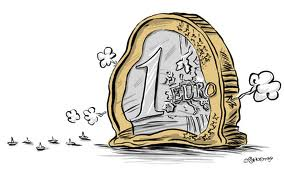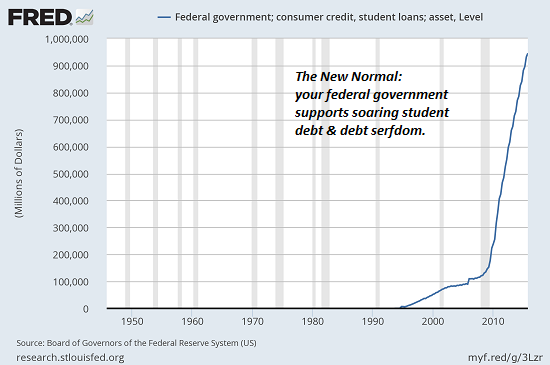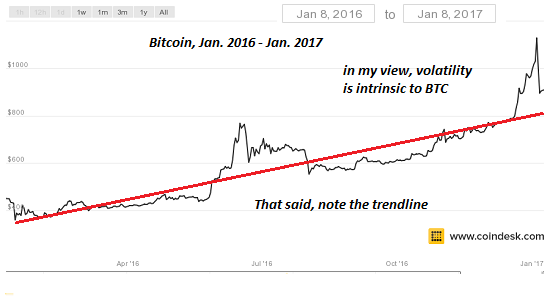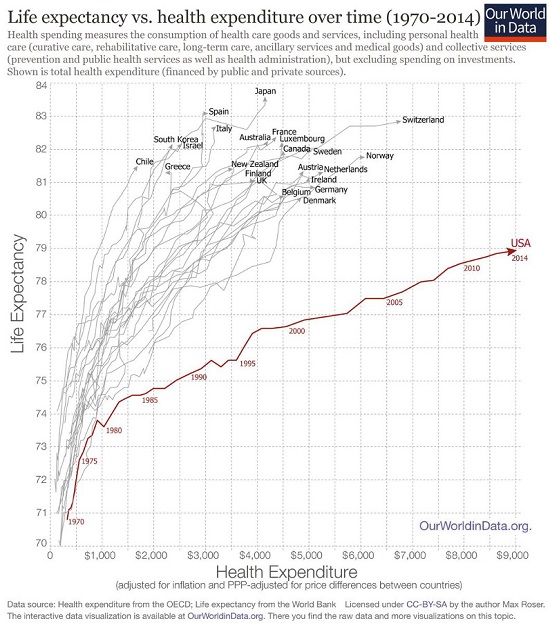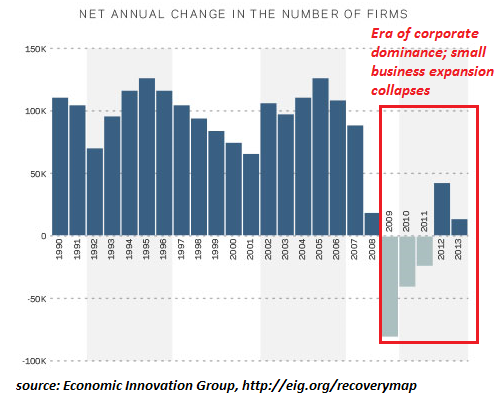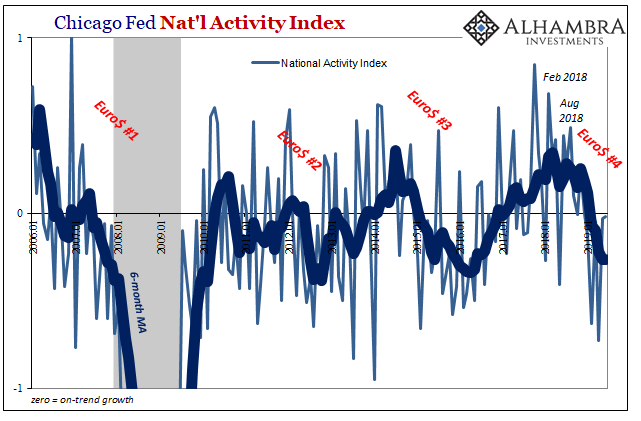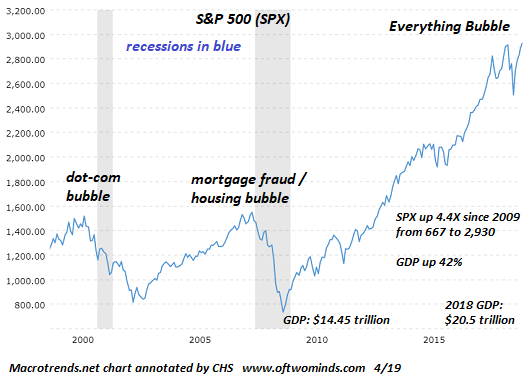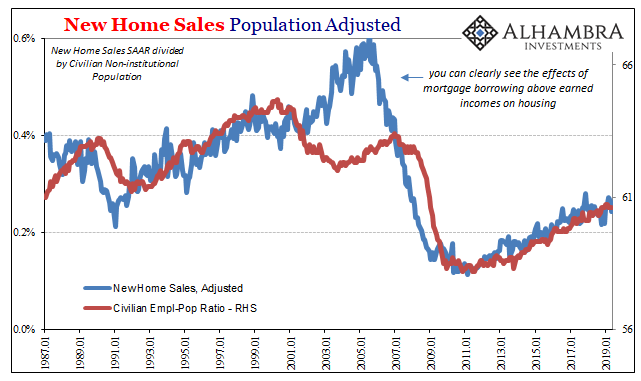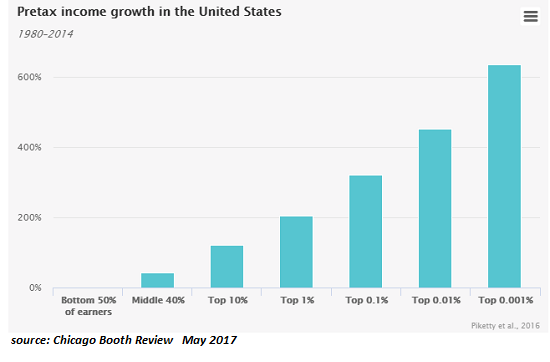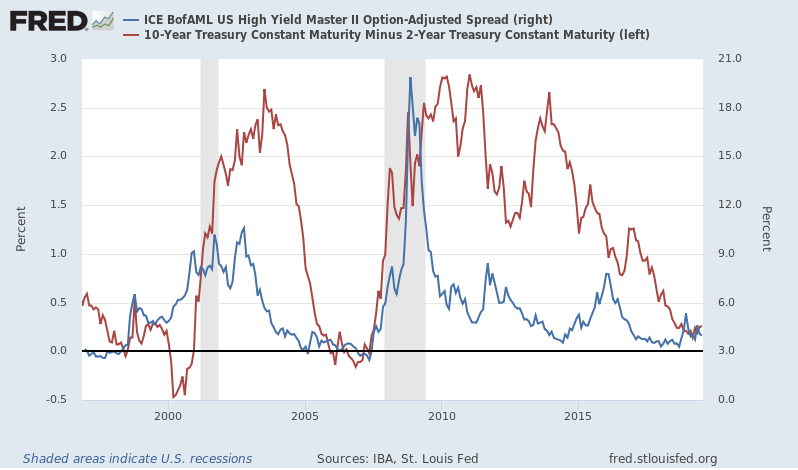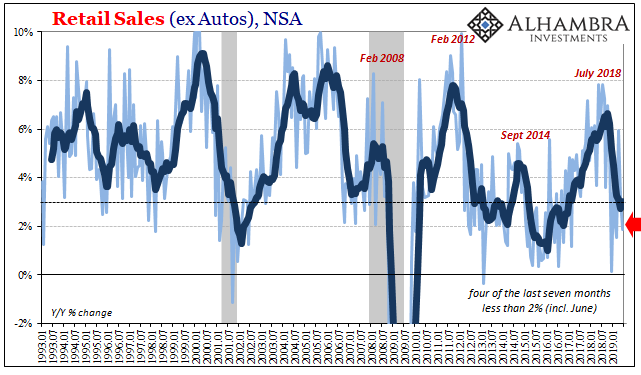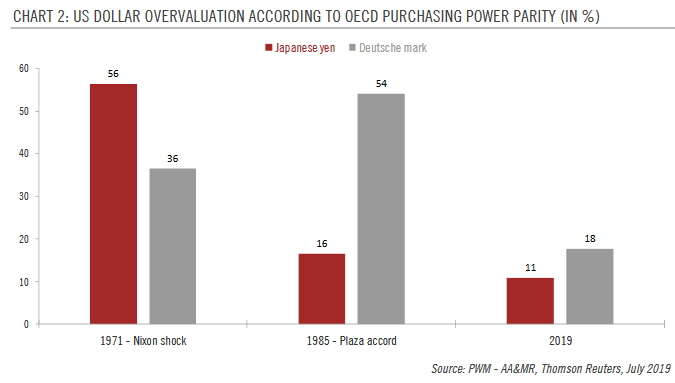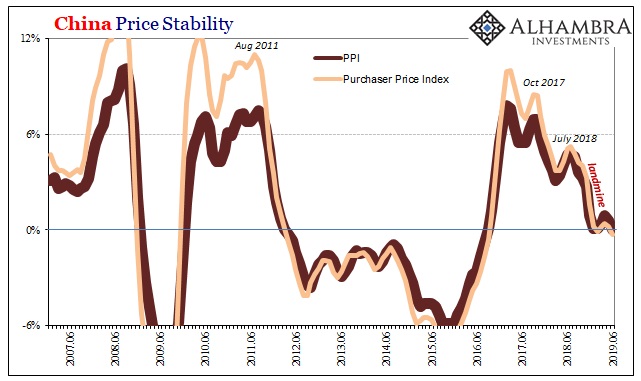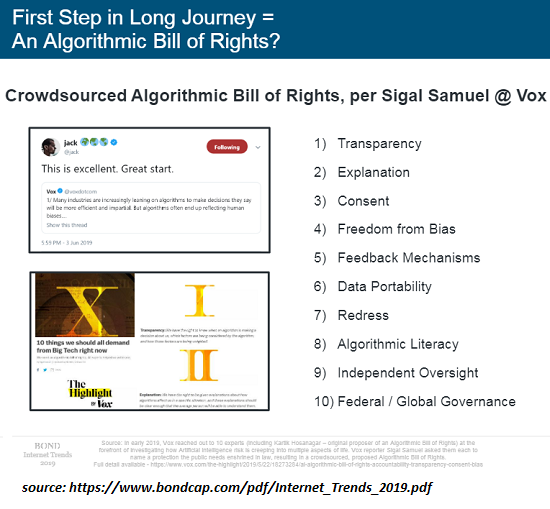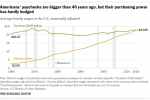Category Archive: 5.) The United States
Want to Bring Back Jobs? It’s Impossible Unless We Fix these Four Things
It's your choice, America--you can keep your cartels and the captured government that enables and protects them, or you can fix what's broken and unaffordable. If there is any goal that might attract support from across the political spectrum, it's creating more fulltime jobs in the U.S. But this laudable goal is dead-on-arrival (DOA) unless we first fix these four things. Why is job growth stagnating? Many point to automation, and yes, that is a...
Read More »
Read More »
Jobless Claims Look Great, Until We Examine The Further Potential For What We Really, Really Don’t Want
Initial jobless claims fell to just 234k for the week of February 4, nearly matching the 233k multi-decade low in mid-November. That brought the 4-week moving average down to just 244k, which was a new low going all the way back to the early 1970’s. Jobless claims seemingly stand in sharp contrast to other labor market figures which have been suggesting an economic slowdown for nearly two years.
Read More »
Read More »
The Colonization of Local-Business Main Street by Corporate America
This is what our mode of production optimizes: ugliness, debt-serfdom, and servitude to politically dominant corporations.
Read More »
Read More »
The Central Banks Pull Back: Now It’s Up to Fiscal Policy to “Save the World”
Another problem is the rise of social discord, for reasons that extend beyond the reach of tax reductions and increased infrastructure spending. Have you noticed that the breathless anticipation of the next central bank "save" has diminished? Remember when the financial media was in a tizzy of excitement, speculating on what new central bank expansion would send the global markets higher in paroxysms of risk-on joy?
Read More »
Read More »
Which Assets Are Most Likely to Survive the Inevitable “System Re-Set”?
Your skills, knowledge and and social capital will emerge unscathed on the other side of the re-set wormhole. Your financial assets held in centrally controlled institutions will not. Longtime correspondent C.A. recently asked a question every American household should be asking: which assets are most likely to survive the "system re-set" that is now inevitable?
Read More »
Read More »
What Would a Labor-Centered Economy Look Like?
How about moving the power to create money from the apex of the pyramid down to its lowest level? Let's spend a moment deconstructing the word "capitalism." Note it contains the word Capital. So far so good. Obviously the key concept here is capital. So what is "capital"? It turns out there are multiple kinds of capital. The most familiar kinds are tangible: cash, orchards, factories, water rights, tools, and so on.
Read More »
Read More »
Why Our System Is Broken: Cheap Credit Is King
You want to fix the economic system, reduce political bribery and reduce rising income inequality? Shut off the cheap unlimited credit spigot to banks, financiers and corporations. Cheap credit--newly issued money that can be borrowed at low rates of interest--is presented as the savior of our economic system, but in reality, it's why our system is broken.
Read More »
Read More »
Ein Macher im Weißen Haus
Donald Trump sagt den alten Eliten den Kampf an. Europas Bürokraten müssen sich warm anziehen. Kürzlich stellte der Hedgefonds-Mogul Ray Dalio eine Analyse des Führungsteams von Donald Trump ins Netz („Reflections on the Trump Presidency, One Month after the Election“).
Read More »
Read More »
The Collapse of the Left
The Left is not just in disarray--it is in complete collapse because the working class has awakened to the Left's betrayal and abandonment of the working class in favor of building personal wealth and power. The source of the angry angst rippling through the Democratic Party's progressive camp is not President Trump--it's the complete collapse of the Left globally. To understand this collapse, we turn (once again) to Marx's profound understanding...
Read More »
Read More »
25 Years of Neocon-Neoliberalism: Great for the Top 5 percent, A Disaster for Everyone Else
It cannot be merely coincidental that the incomes and wealth of the top 5% have pulled away from the stagnating 95% in the 25 years dominated by neocon-neoliberalism. One unexamined narrative I keep hearing is: "OK, so neocon-neoliberalism was less than ideal, but Trump could be much worse." Let's start by asking: would Syrian civilians agree with this assessment?
Read More »
Read More »
Draghi Lets Steam out of Euro
US reported stronger than expected series of data, including a large drop in weekly jobless claims for the week of the next NFP survey. Draghi remained dovish, with key phrases retained. Euro needs to break $1.0575 now to confirm a top is in place. Markets still uncertain ahead of the start of the new Administration.
Read More »
Read More »
Will Our Grandchildren Wonder Why We Didn’t Build a Renewable Power Grid When It Was Still Affordable?
Anyone seeking clarity on the energy picture a decade or two out is to be forgiven for finding a thoroughly confusing divide. On the one hand, we have reassuring projections from the U.S. Energy Information Administration (EIA) that assume current production of fossil fuels will remain steady for decades to come.
Read More »
Read More »
Dear Self-Proclaimed “Progressives”: as Apologists for the Neocon-Neoliberal Empire, You Are as Evil as the Empire You’ve Enabled
Dear Self-Proclaimed "Progressive": I love you, man, but it has become necessary to intervene in your self-destruction. Your ideological blinders and apologies for the Establishment's Neocon-Neoliberal Empire are not just destroying your credibility, they're destroying the nation and everywhere the Empire intervenes.
Read More »
Read More »
What’s Truly Progressive?
What's progressive? Pushing power, agency, skills, capital and solutions down to the individual, household, community, enterprise, town and city levels and focusing on doing more with much less.
Read More »
Read More »
The Eight Forces That Are Pressuring Profits
If there is any economic assumption that goes unquestioned, it's the notion that profits will remain robust for the foreseeable future. This assumption ignores the tidal forces that are now flowing against profits. Any discussion of corporate profits must start by noting the astonishing rise in U.S. corporate profits since the heyday of the late 1990s dot-com boom. From $800 billion to $2.4 trillion in a few years is not just extraordinary--it's...
Read More »
Read More »
Why Don’t the U.S. Dollar and Bitcoin Drop to Their Tangible Value, i.e. Zero?
I have covered the many reasons why the U.S. dollar (USD) has strengthened in dozens of posts over the past 5 years, (Could the U.S. Dollar Rise 50%?, January 12, 2011), and I described the positive dynamics of bitcoin last summer in An Everyman's Guide to Understanding Cryptocurrencies (June 13, 2016), back when bitcoin was under $600.
Read More »
Read More »
Why Profits Are Faltering
Profits are faltering for structural reasons that are not easily resolved. The bedrock assumption of the Bull market is that corporate profits will keep rising indefinitely. Hiccups are allowed, but current stock market valuations are implicitly based on profits expanding.
Read More »
Read More »
We Can Only Afford One, So Choose Wisely: Social Security/Medicare, Cartel Cronyism or Inflation (a.k.a. Central Banking)
Here's the problem with central banks seeking higher inflation: costs go up but wages don't. It's easy to quantify the annual cost of Social Security/Medicare, and not so easy to calculate the cost of Cartel Cronyism and Central Bank-created inflation.Cartel cronyism is a hidden tax on the entire economy, as is Central Bank-created inflation.
Read More »
Read More »
Prosperity = Abundant Work + Low Cost of Living
If we seek a coherent context for the new year, we would do well to start with the foundations of widespread prosperity. While the economy is a vast, complex machine, the sources of widespread prosperity are not that complicated: abundant work and a low cost of living.
Read More »
Read More »
Fragmentation and the De-Optimization of Centralization
Many observers decry the loss of national coherence and purpose, and the increasing fragmentation of the populace into "tribes" with their own loyalties, value systems and priorities. These observers look back on the national unity of World War II as the ideal social standard: everyone pitching in, with shared purpose and sacrifice. (Never mind the war killed tens of millions of people, including over 400,000 Americans.)
Read More »
Read More »









